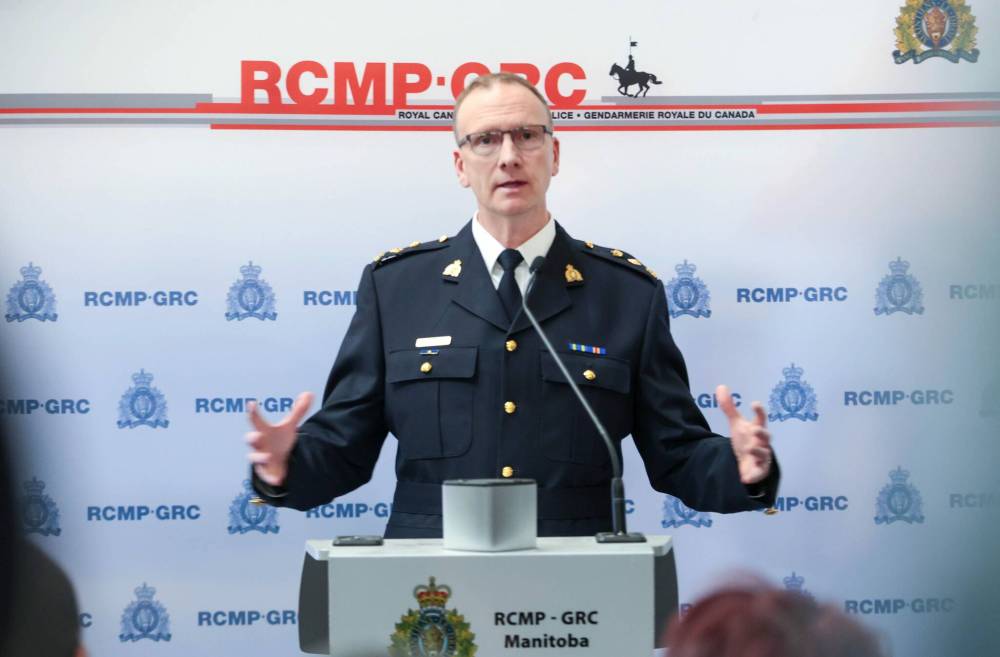RCMP seeks public’s help with homicides
Advertisement
Read this article for free:
or
Already have an account? Log in here »
We need your support!
Local journalism needs your support!
As we navigate through unprecedented times, our journalists are working harder than ever to bring you the latest local updates to keep you safe and informed.
Now, more than ever, we need your support.
Starting at $15.99 plus taxes every four weeks you can access your Brandon Sun online and full access to all content as it appears on our website.
Subscribe Nowor call circulation directly at (204) 727-0527.
Your pledge helps to ensure we provide the news that matters most to your community!
To continue reading, please subscribe:
Add Brandon Sun access to your Free Press subscription for only an additional
$1 for the first 4 weeks*
*Your next subscription payment will increase by $1.00 and you will be charged $20.00 plus GST for four weeks. After four weeks, your payment will increase to $24.00 plus GST every four weeks.
Read unlimited articles for free today:
or
Already have an account? Log in here »
Hey there, time traveller!
This article was published 13/12/2024 (376 days ago), so information in it may no longer be current.
WINNIPEG — Manitoba Mounties say investigators can’t solve this year’s onslaught of homicides — driven, in part, by alcohol and the illicit drug trade in isolated communities — if the public stays silent.
RCMP have handled 56 homicide cases this year to date, nearly doubling the typical annual average. The number is expected to increase to 60 before Jan. 1, police said Thursday.
Supt. Rob Lasson, head of the provincial major crimes division, spoke about the issue to reporters in a series of one-on-one interviews at RCMP D Division headquarters in Winnipeg.

RCMP Supt. Rob Lasson, head of the provincial major crimes division, described this year’s spike in violence as “concerning,” but said it is too early to determine whether it is an anomaly or the new normal. (File)
“The RCMP can’t do this alone,” he said, calling for more support from community members.
“When there is an unfortunate incident like a homicide in a community there is always somebody that knows, it’s just — how do we get that person to come across and tell us what happened?” Lasson said.
“We continue to create communication pathways, to build that trust.”
Data provided by RCMP show Manitoba has averaged 30 homicides each of the past five years.
The number of slayings declined during the COVID-19 pandemic, from 27 in 2019 to 26 and 22 in the following two years, respectively.
The rate of such violence increased to 38 in 2022 and dipped again to 30 in 2023, the data show.
Lasson said it is “concerning” Manitoba is on track to double last year’s numbers, but said it is too early to determine whether it is an anomaly or the new normal.
He said the high number of homicides has been taxing for his team, which is based in Winnipeg and travels around the province to investigate slayings alongside Mounties in local detachments.
The issue has been exacerbated by the widespread nature of the trend, which shows fatalities increasing in rural and remote communities throughout the province.
“It’s not really specific to one area. That’s a little bit more concerning to me, because if you have a certain amount in one community, we are able to dig into that community and look at the root causes,” Lasson said.
About 36 Mounties form the major crimes unit, but they are sometimes helped by additional specialized officers depending on the nature of the investigation, he added.
“Right now … we’re all combined as one team, just to prioritize the new homicides; to get a grip on that,” Lasson said.
Asked about root causes, Lasson said the COVID-19 pandemic and its associated financial and social pressures are considered contributing factors.
The trend is also driven by criminal networks, which can quickly take hold of isolated communities.
Gangs, some from outside the province, have begun utilizing social-media networks to intimidate, manipulate and recruit new members.
Such networks can take hold over vulnerable people, plying them with intoxicants and driving them to desperation, Lasson said.
“A continued trend of alcohol and drugs entering into some of our remote communities is a contributing factor, that’s a root cause,” he said.
“Oftentimes, our communities in remote areas don’t have the support for addictions, or counselling and things like that to get people out of their addiction, and it creates that propensity of crime and violence to support that addiction … It can happen very quickly.”
RCMP hope to address the issue by collaborating with other police agencies and other partners, including Child and Family Services, addictions care providers and local governments to develop prevention strategies.
Lasson said building communication channels, sharing information and pooling resources is “critical” for developing prevention strategies.
Mounties continue to place faith in joint police ventures such as the Manitoba integrated violent offender apprehension unit, which pairs 12 officers from the Winnipeg Police Service and Manitoba RCMP (six from each agency) to conduct targeted arrests and operations.
The unit arrested 17 violent, high-risk offenders in northern Manitoba last week alone, Lasson said.
In October, police lauded the success of the unit, announcing it had arrested a new suspect nearly every day since it launched in May 2023.
At the time, it had placed 480 people behind bars.
Including all police agencies in Manitoba, the province reported 74 homicides in 2023 for a rate of 5.09 per 100,000 people, a recent Statistics Canada study found.
Of those, 51 victims, or 69 per cent, were of Indigenous identity.
Manitoba had 89 homicides in 2022 (6.3 incidents per 100,000 residents), up from 62 in both 2021 and 2020 and 74 in 2019, Statistics Canada data show.
» Winnipeg Free Press
